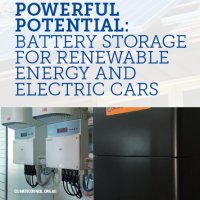The market for solar + battery storage globally is expected to grow tenfold in less than five years – and Australia will be one of the largest markets for battery systems.
A new report from the Climate Council says ‘behind-the-meter’ battery storage is expected to experience similar growth to that of solar PV and half of all households in Australia are predicted to install solar + battery systems.
While the Australian Energy Market Operator has predicted a potential battery storage market of 0.5 GW in 2017-18, 3.4 GW in 2024-25 and 8 GW in 2034-35; those figures are only in relation to new solar + storage installations. The estimates do not take into account the demand from Australia’s 1.4 million+ households and businesses that have already installed solar panels.
Australia’s passion for battery storage will be driven by the existing level of solar panel arrays, cheap solar, reducing feed in tariffs and high prices for mains-grid supplied electricity.
Confidence in the Australian storage market is so high that leading manufacturers such as Enphase Energy (AC Battery) and Tesla (Powerwall) have announced Australia will be among the first countries in the world to receive their battery solutions.
Energy Matters’ parent company, SunEdison, has already seen significant interest in storage; with nearly 2,600 people signing up for pre-release announcements regarding residential battery solutions. The company is already offering battery-ready solar power systems.
The Climate Council report states even reasonably small battery storage systems can almost double a household’s self-consumption of solar electricity generation. By as early as 2018, installing batteries and dumping a mains grid connection altogether could be cost-competitive with staying connected.

“As battery costs continue to fall, battery storage will become an increasingly attractive option for storing renewable electricity at the household, business and community level,” states the report.
Battery systems solve many of the remaining challenges associated with renewable energy, such as intermittency. Energy storage can promote grid stability by shaving demand during peak periods and reduce the amount of grid infrastructure investment required by network operators. Battery storage also has the potential to slash the wholesale price of electricity by reducing reliance on expensive gas peaking plants.
Electric cars could also play a significant role in the nation’s energy storage revolution. Australians choosing electric vehicles will benefit from reduced transport costs and be able to use their cars for household electricity storage.
The Climate Council’s report, “Powerful Potential: Battery Storage for Renewable Energy and Electric Cars”, can be downloaded here (PDF).
Related
Australian Guide To Home Energy Storage
What Is a Battery-Ready Solar Power System?

















































